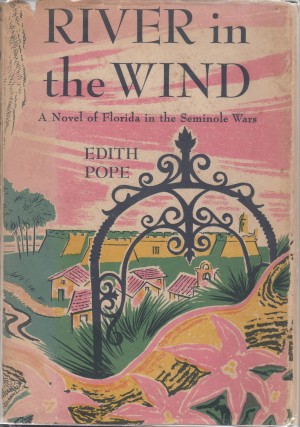River in the Wind by Edith Pope (1954. Scribners.)
My review of Pope’s seminal novel about race, which I liken to To Kill a Mockingbird in its tenor and complexity, appears elsewhere on this site. After being provided a copy of Pope’s best known work to review for the Rural Lit R.A.L.L.Y. website, I explored Pope’s career and bibliography to learn more about this forgotten literary figure. I came across a used copy of River in the Wind on Amazon and decided to give it a read. Despite the title to this review, the book didn’t disappoint me.
River in the Wind was billed, when it debuted in 1954 (the year of my birth!) as historical fiction. That label is only partly true. In many ways, the story is also a literary romance, chronicling the relationship between Thad Renfro, the son of an orange grove manager and his wife, and Medora King, daughter of federal territorial judge William King and his wealthy wife, Georgiana. Medora, only sixteen when the story begins, is placed in an arranged marriage with Moncure Lauren, a bland, uninviting bank speculator more than a decade Medora’s senior. Much of the plot involves exploring the loathing Medora feels for her husband and the love she retains for Thad, a boy approximately her own age. There is also the domestic drama of the Judge’s sexual relationship with a household slave, Delphie, to spice things about a bit in the King household. But beyond the domestic complexities of early 19th century frontier Florida, the story also involves history. In a markedly personal and detailed manner, Pope reveals the suffering on both sides of the Seminole Indian War that plagued much of the territory of Florida during the mid 1800s. Thad’s service in the United States Army, alongside veteran scout Jeff Orcutt and historic figures such as General Winfield Scott, is chronicled and brought to reality without little sentimentality or exaggeration. And was true in Colcorton, the author uses finely tuned descriptions of her native state as an adjunct to the human characters in the tale:
The scallops in the sand were etched in indigo as they walked homeward. Along the inlet and the air was a great traffic of sanderlings and dowitchers, godwits, and terns. Around the horizon the air looked thin, a colorless rim that merged into the blue. The sky about deepened to cerulean and overhead to cobalt. Medora and Thad passed the point and started up the river. The east bank was lit with a pink glow that, as daylight began its ebb, seemed less to be washed over than suddenly to gleam forth from grasses and trees. The western shore stood in its shadow, unadorned. Looking upward, Medora spoke as if bemused. “You’re wonderful and I thought you were just Thad.”
At times, as demonstrated by the line of dialogue quoted above, Pope’s writing deteriorates a bit as she attempts to render an accurate portrayal of two adolescents negotiating love and adulthood. And the romance, while fuel for the longings that drive Thad back to the King house in St. Augustine time and time again, thus propelling the plot towards its conclusion, does become a bit tiresome towards the end of the book. But the writing is, in most other areas, top notch and complex with more than enough spice, war, social justice, and intrigue to keep readers interested nearly sixty years after the book was penned.
All in all, a neatly crafted story regarding an area of the country that doesn’t get enough attention in historical fiction.
4 stars out of 5.



